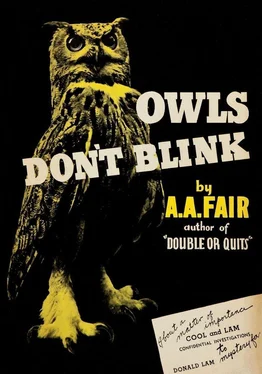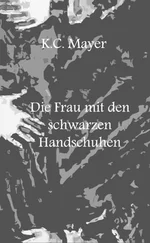She nodded.
“It was very, very clever,” I said. “It’s a very neat way of turning defeat into triumph. Marco Cutler thought he had a good divorce. He went to Mexico before he had a final decree, and remarried. You waited long enough so it would look as though you were acting in good faith. Then you wrote Roberta Fenn a letter, asking her to be nice to some man who was a friend of yours. That was the first time Roberta had had your address. She answered that letter by writing to tell you that after you had left, papers had been served on her, that because she had promised you that no matter what happened, she’d swear she was Edna Cutler, she had told the man who served the papers that that was her name. You immediately wrote back and asked Roberta to send the papers on to you. She sent them on, and that gave you all you needed to swear that that was the first time you had any knowledge you had been divorced. Prior to that time you thought you were still the wife of Marco Cutler, separated, of course, but still his wife.”
“So you wrote to your husband and asked him how he got that way, pointing out to him that his divorce wasn’t any good because the papers hadn’t been served OR you. In other words, you now had him hooked, and you were going to make him pay through the nose. He didn’t dare let his present wife get the least inkling of the true facts of the case. In short, you’ve got him where you want him.”
I quit talking and looked at her, waiting for her to say something.
At length, she said, “ You make it sound as though I had worked it out as a clever idea. As a matter of fact, I had absolutely no thought of anything except to get away from it all. My husband had framed me. He had subjected me to all sorts of humiliations. I don’t know whether it was because he had determined to smear me so badly I couldn’t hold my head up among my friends, or whether he himself had been victimized. He’d hired private detectives and had paid them a fancy sum. Those detectives had to produce evidence to get money, so they kept sending in all sorts of lies to Marco, and Marco gleefully thought he was getting something on me. He paid them fabulous sums.”
She stopped for a moment and bit her lip, apparently fighting for self-control.
“And then?” I asked.
“Then,” she said, “when he told me what he had, when he showed me the reports of the detective agency, when he let me read that pack of lies, I almost went crazy.”
“You didn’t admit them, did you?”
“Admit them! I told him they were the most awful lies I had ever read anywhere. I had a complete nervous breakdown. I was under the care of a physician for two weeks, and it was my doctor who told me to travel and get away from, everything, to go some place where there would be nothing to remind me of what had happened, simply to clear out.”
“A sympathetic doctor?” I asked, smiling.
“He was very understanding.”
“Gave you his advice in writing?” I asked.
“How did you know?”
“I was just wondering.”
“Well, as a matter of fact, he did. I went to San Francisco. While I was there, I wrote him a letter. I told him I didn’t feel like coming back and asked him what he thought I should do, and he wrote me this letter telling me he thought it was an excellent idea for me to get a complete change.”
“And, of course, you just happen to have saved that letter. Go ahead.”
“I went to New Orleans. Everything was fine for about three weeks. I stayed in a hotel, while I was looking around to find an apartment. Then something happened.”
“What was it?”
“I met someone on the street.”
“Someone who knew you?”
“Yes.”
“From Los Angeles?”
“Yes. So I decided to disappear.”
I said, “That doesn’t work. If you met someone on the street in New Orleans who knew you in Los Angeles, you’d also meet someone on the street in Little Rock, Arkansas, Shreveport, or Timbuctoo.”
“No. You don’t get it. The friend wanted to know where I was living. I had to tell her. I knew that she’d tell her friends, and the first thing I knew, everybody would know that I was in New Orleans, and be looking me up. I didn’t want to see people who knew anything at all about my old life, but I did want to have a place in New Orleans that I could come back to. Then I met Rob. She was having troubles of her own. She wanted to escape from her identity. I asked her how she’d like to trade identities. She said she’d like it swell. I told her to find a suitable apartment that would be something I could live in later on when I got ready to come back to New Orleans, and about what I was willing to pay for it.”
“What name did you take?” I asked.
“Rob’s.”
“For how long?”
“For not more than two or three days.”
“Then what?”
She said, “I suddenly realized what damning evidence I was manufacturing. If my husband’s lawyers found out about it, they would show that I had gone away and started living under an assumed name. That would have been a confession of guilt, so I took my own name back. That simply meant there were two Edna Cutlers. One of them was Rob who was living in New Orleans, and the other was the real Edna Cutler.”
I said “Very, very interesting. It would make even the most hard-boiled judge cry into his law books.”
“I’m not asking for sympathy. I’m only asking for justice.”
I said, “All right, now let’s cut out the comedy. You didn’t think this up.”
“What do you mean?”
“You didn’t think up all that scheme for letting your husband hit the jackpot, and then find out the machine was empty.”
“I don’t get you.”
I said, “I’ve known lots of lawyers. There have perhaps been four or five who could have thought up a trick like that, but the point is it took a lawyer to do it and it took a darned ingenious lawyer to do it.”
“But I tell you it wasn’t any scheme. I didn’t think it up.”
I said, “That brings us back to our friend, Paul G. Nostrander.”
“What about him?”
“You knew him?”
She hesitated for several seconds over that question. I grinned while she was groping for an answer, then went on to say, “You never expected that question would be put to you in just that way, did you, Edna? You hadn’t thought up your answer on that.”
She said defiantly, “No. I didn’t know him.”
I saw Roberta Fenn’s face show surprise.
I said, “That’s where you’re making your fatal mistake.”
“What do you mean?”
I said, “Nostrander’s secretary will probably remember that you were in the office. His books will show that, at least at the start, he received a fee from you. The people at Jack O’Leary’s Bar will remember that you were in there together. They’ll trap you in perjury. Your husband would spend a fortune on private detectives tracking all that stuff down. They’d bring that out in court, and a judge would realize you’d simply—”
She interrupted me to say, “All right, I knew him.”
“How well?”
“I–I’d consulted him.”
“And what did he tell you?”
“Told me that the only thing for me to do was to quit worrying, and,” she went on triumphantly, as she realized the strength of this new defense, “he told me not to do anything at all until papers were served on me, that as soon as papers were served on me to let him know.”
I said, “That’s a swell line. Nostrander’s dead. He can’t contradict you on that, you know.”
She contented herself with glaring at me, but made no other denial.
I turned to Roberta. “You knew him?”
“Yes.”
“How did you meet him?”
Читать дальше












